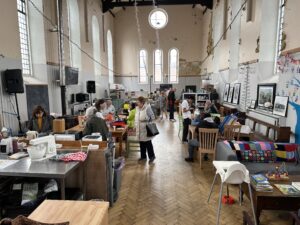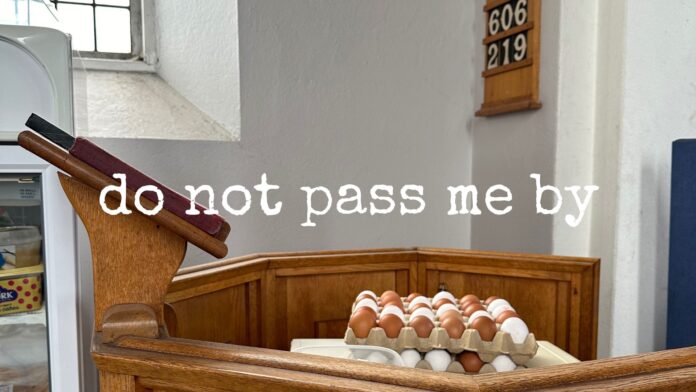I was back in the pulpit at Mount Carmel Congregational Church this past Sunday after my time away in and around Belfast. I am grateful I get to be in both places. Here is what I found at the crossroads.
_________________________
Since I just got back from Ireland where I was the chef for two peace retreats, I assume you are expecting I would have stories to tell, and I don’t want to disappoint you. My trips there over the last three summers have given me an experience I have not had before when I have travelled, and that is being able to spend extended time in the same place more than once. If I add up all my trips, I have spent about eight weeks in Belfast and the surrounding area.
As a result, my memories have become increasingly more about people because I have had the chance to be around them more than once. The place I have visited the most is called The Larder. Here is how they describe themselves:
The Larder is a community food hub in East Belfast that believes everyone deserves good food. Our members can shop with us weekly, purchasing high quality produce for affordable prices.
 They are housed in a church building that was deconsecrated by the Church of Ireland but was then resurrected by The Larder and by St. Christopher’s, the faith community from which it was born. And it began not as an idea, but as a response to a tangible request: a woman who had just moved into the neighborhood came by asking for food because she was desperate and hungry. They met a need with love in a tangible way that created trust.
They are housed in a church building that was deconsecrated by the Church of Ireland but was then resurrected by The Larder and by St. Christopher’s, the faith community from which it was born. And it began not as an idea, but as a response to a tangible request: a woman who had just moved into the neighborhood came by asking for food because she was desperate and hungry. They met a need with love in a tangible way that created trust.
And trust is at the heart of our scripture passage this morning that intertwines two stories that are otherwise unconnected, other than both people came looking for Jesus. It starts with a man called Jairus, who was a leader at the synagogue, found Jesus in the middle of a crowd and begged him to come to his house because his twelve-year-old daughter was dying.
Jesus changed whatever plans he had and went with him.
So did the crowd. And in that crowd was a woman who had been dealing with some sort of hemorrhaging for twelve years—she had been sick as long as the little girl had been alive. She had spent many of those years seeking medical attention, but things had only gotten worse. The gospel said, “She had heard about Jesus,” and so she braved the crowd to get close enough just to touch his clothes, trusting that the contact would change things.
When she did, Jesus stopped, which must have made Jarius’ heart sink.
“Who touched me?” Jesus asked.
And I love the way the disciples responded. “We’re in the middle of a giant crowd and you want to know who touched you? Everybody touched you! That’s what a crowd is.”
But Jesus kept scanning the crowd until his eyes caught hers. The gospel says she came forward in fear, but Jesus affirmed the trust she showed in her touch. “You’re faith has restored you.”
No sooner had Jesus spoken those words than another religious leader came to say Jairus’ daughter had died and Jesus needn’t bother coming to the house. Jesus looked at Jairus and said, “Keep trusting me,” and they kept moving. When they got to the house, the yard was filled with mourners, but Jesus reframed the situation: “She has not died, she is sleeping.”
He took her hand and said, “Talitha koum,” which means, “Little girl, wake up,” and she did. And Jesus told them to feed her.
The talk of food takes me back to The Larder.
When you walk into the room that was once a sanctuary, about a third of it is set up like a small grocery store. There is a wall of shelves holding various canned goods, another with a bank of canisters holding bulk dry goods like rice and lentils, some other shelves holding bins of fresh produce as well as eggs, and a table with dried herbs and spices. The back end of the sanctuary, or what was once the chancel, is storage and office space, and in between is a small kitchen and a number of tables and chairs.
Volunteers make food for those who are coming to shop, much like we do for coffee hour, and there is coffee and tea. People don’t stand in line. They sit and talk and snack until it’s their turn to shop. I sat down to talk to a woman because she had the cutest little girl who kept waving at me. They were new to Belfast, having moved from Derry a couple of months before.
“I heard about The Larder, so I came for help, and they have helped me” she said. And they gave her something to eat and a place to belong. The Larder is not solving all the problems of her life, but they are making her feel seen and they are helping her find hope.
In another conversation, someone was talking about a loved one who had been diagnosed with cancer and they said, also with some hope, “It’s treatable, but not curable.”
Those words continued to ring in my ears as I read our stories for today where both women, young and old, were healed. The older woman’s bleeding stopped; the little girl got up from her deathbed and had lunch. And they both went on to whatever the rest of their lives held until they died.
Life, it seems, is treatable but not curable. We all need to be seen, to be noticed and cared for in a way that helps us trust that Love does not let us go.
Because of my trip, I had to put the order of service together about a month ago. As I did, the song that kept coming to mind was “Pass Me Not, O Gentle Savior,” which I am going to sing in a moment. It was one of the earliest hymns written by Fanny Crosby, who went blind when she was six weeks old. She later taught at the New York School for the Blind and was involved in many ministries. This hymn grew out of a visit to a prison where she heard one of the prisoners plead, “Good Lord, do not pass me by.”
It could be the theme song for both Jairus and the woman whose name we never know; it could be the theme song for most anyone we know, depending on the situation. Part of what I love about the song is the plea is not resolved, and by that I mean that we are left to trust that God will answer, that Love will show up in a touch, or a word, or a meal. And we have to pay attention, because sometimes we are the ones who the agents of God’s love, who are reaching out, offering words of encouragement, and feeding those who are hungry so that they are not passed by.
Pass me not, O gentle Savior, hear my humble cry
While on others thou art calling do not pass me by
Savior, Savior, hear my humble cry
While on others Thou art calling do not pass me by
Thou the spring of all my comfort more than life to me
Whom have I on earth beside thee? Whom in heav’n but thee?
I’m calling Savior, Savior, hear my humble cry
While on others Thou art calling do not pass me by
Amen.
Peace,
Milton
PS–I know lots of folks are meeting the needs in front of their faces, much like the folks at the Larder. I also know all of them need help. Please check out what they are doing in East Belfast. If you would like to contribute, you can do it here.
One more thing: here’s an old video of me singing “Pass Me Not” as a mashup with REM’s “Eveerybody Hurts.”
